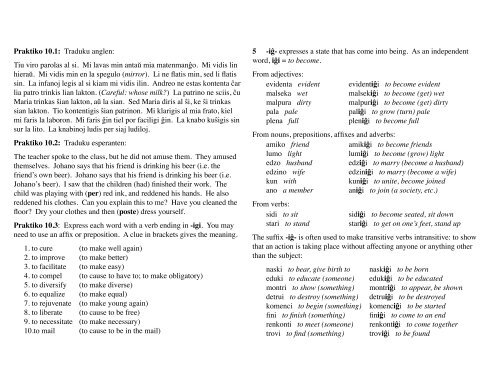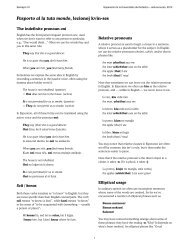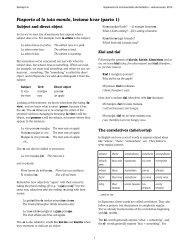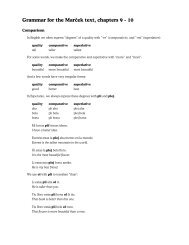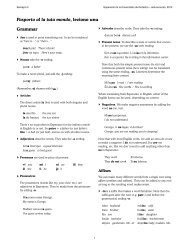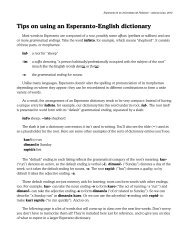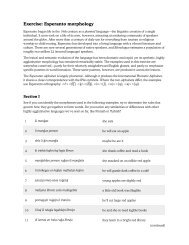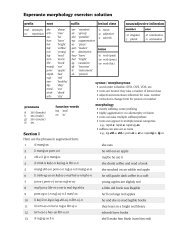The alphabet and pronunciation - Lodestone
The alphabet and pronunciation - Lodestone
The alphabet and pronunciation - Lodestone
- No tags were found...
Create successful ePaper yourself
Turn your PDF publications into a flip-book with our unique Google optimized e-Paper software.
Praktiko 10.1: Traduku anglen:Tiu viro parolas al si. Mi lavas min anta! mia matenman"o. Mi vidis linhiera!. Mi vidis min en la spegulo (mirror). Li ne flatis min, sed li flatissin. La infanoj legis al si kiam mi vidis ilin. Andreo ne estas kontenta #arlia patro trinkis lian lakton. (Careful: whose milk?) La patrino ne sciis, #uMaria trinkas $ian lakton, a! la sian. Sed Maria diris al $i, ke $i trinkassian lakton. Tio kontentigis $ian patrinon. Mi klarigis al mia frato, kielmi faris la laboron. Mi faris "in tiel por faciligi "in. La knabo ku$igis sinsur la lito. La knabinoj ludis per siaj ludiloj.Praktiko 10.2: Traduku esperanten:<strong>The</strong> teacher spoke to the class, but he did not amuse them. <strong>The</strong>y amusedthemselves. Johano says that his friend is drinking his beer (i.e. thefriend’s own beer). Johano says that his friend is drinking his beer (i.e.Johano’s beer). I saw that the children (had) finished their work. <strong>The</strong>child was playing with (per) red ink, <strong>and</strong> reddened his h<strong>and</strong>s. He alsoreddened his clothes. Can you explain this to me? Have you cleaned thefloor? Dry your clothes <strong>and</strong> then (poste) dress yourself.Praktiko 10.3: Express each word with a verb ending in -igi. You mayneed to use an affix or preposition. A clue in brackets gives the meaning.1. to cure% (to make well again)2. to improve% (to make better)3. to facilitate% (to make easy)4. to compel% (to cause to have to; to make obligatory)5. to diversify% (to make diverse)6. to equalize% (to make equal)7. to rejuvenate% (to make young again)8. to liberate% (to cause to be free)9. to necessitate% (to make necessary)10.to mail% (to cause to be in the mail)5! -i"- expresses a state that has come into being. As an independentword, i"i = to become.From adjectives:% evidenta evident! evidenti"i to become evident! malseka wet! malseki"i to become (get) wet! malpura dirty! malpuri"i to become (get) dirty! pala pale! pali"i to grow (turn) pale! plena full! pleni"i to become fullFrom nouns, prepositions, affixes <strong>and</strong> adverbs:% amiko friend! amiki"i to become friends! lumo light! lumi"i to become (grow) light! edzo husb<strong>and</strong>! edzi"i to marry (become a husb<strong>and</strong>)! edzino wife! edzini"i to marry (become a wife)! kun with! kuni"i to unite, become joined! ano a member! ani"i to join (a society, etc.)From verbs:% sidi to sit! sidi"i to become seated, sit down! stari to st<strong>and</strong>! stari"i to get on one’s feet, st<strong>and</strong> up<strong>The</strong> suffix -i"- is often used to make transitive verbs intransitive: to showthat an action is taking place without affecting anyone or anything otherthan the subject:% naski to bear, give birth to! naski"i to be born! eduki to educate (someone)! eduki"i to be educated! montri to show (something)! montri"i to appear, be shown! detrui to destroy (something)! detrui"i to be destroyed! komenci to begin (something)! komenci"i to be started! fini to finish (something)% fini"i to come to an end! renkonti to meet (someone)! renkonti"i to come together! trovi to find (something)! trovi"i to be found


